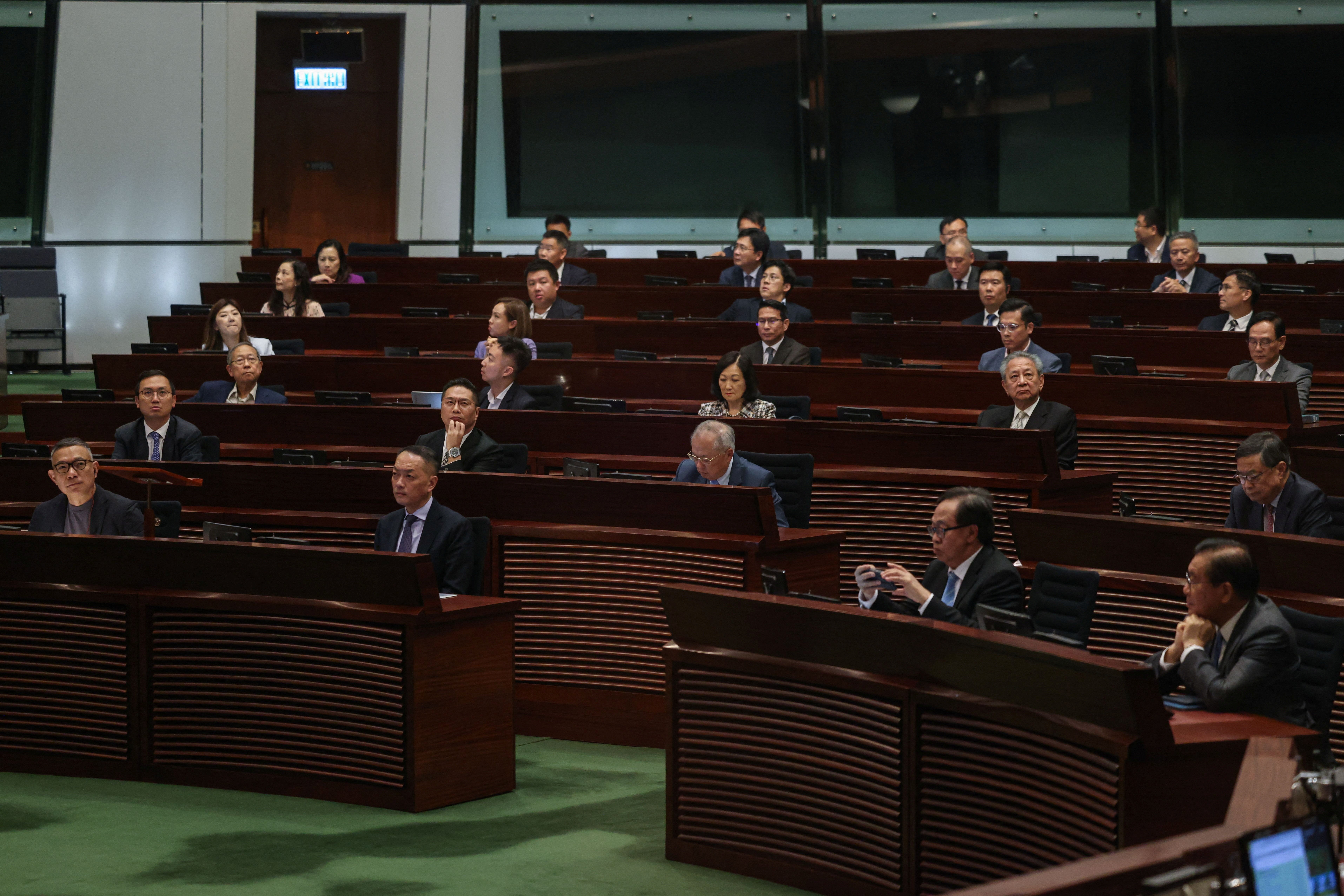Hong Kong’s government rejected a bill on Wednesday that would have allowed same-sex couples who married or entered civil unions overseas to register their partnerships locally.
The bill – Registration of Same-Sex Partnerships Bill – unveiled in July, faced fierce opposition from lawmakers and was expected to be voted down on Wednesday.
A total of 71 lawmakers voted against the bill, with one legislator, Doreen Kong, abstaining.
If the bill had been passed, that would have meant registered couples would have received limited rights, such as making medical decisions for their partners and arranging after-death matters.
The bill, however, did not cover parental or adoption rights.
Right before the vote on Wednesday, lawmaker Maggie Chan said the bill “rocks the foundation of the monogamous and heterosexual marriage system in Hong Kong”.
Supporters had earlier argued that the bill was necessary to meet a top court ruling that the government must legally recognise same-sex couples by this fall.
In 2023, the Court of Final Appeal set a two-year deadline for the government to establish a framework recognising same-sex partnerships, with 27 October as the target date.
A recent survey had found that 60 per cent of Hong Kong residents supported same-sex marriage, up from 38 per cent in 2013. The city’s leader, John Lee, had urged lawmakers to pass the bill, saying the rule of law is important for Hong Kong’s success, but had also said the final decision was with the legislature.
Amnesty International Hong Kong Overseas and 30 LGBTQ+ groups across Asia issued a joint letter on Monday, urging the government to “fully comply” with the 2023 ruling by the city’s court of final appeal.
#Breaking: Hong Kong legislature just vetoed the government's same-sex partnerships bill with 71 out of the 90 lawmakers in total opposing it. The bill even can't make it to the third read. pic.twitter.com/2ukmwInyMK
— Phoebe Kong (@phoebe_kongwy) September 10, 2025
Lawmaker Martin Liao, who supported the bill, said: “It cannot be denied that there is discrimination and unfairness in Hong Kong society’s [treatment] of same-sex couples.
“When society lacks a legal framework to recognise same-sex partnerships, gay people could feel… inferior and humiliated, [knowing] their same-sex relationships are not legal and unrecognised,” he was quoted as saying by Hong Kong Free Press.
Hong Kong law currently does not recognise same-sex relationships, and same-sex couples cannot marry or register any form of civil partnership. While recent court rulings have acknowledged that denying rights to same-sex couples is discriminatory, legislative progress has been slow.
Courts have granted limited rights to couples who married or entered civil partnerships abroad, including spousal benefits for civil servants, taxation rights, eligibility for public housing, and inheritance rights, but a comprehensive legal framework for same-sex partnerships remains absent.

Opponents to the bill had argued that the bill undermined traditional family values and could lead to broader demands such as same-sex adoption. Holden Chow, the vice chair of the city’s largest pro-Beijing party, warned that the bill could “result in dire consequences” for traditional Chinese family values.
Another pro-Beijing lawmaker, Priscilla Leung, earlier described the bill as “opening a Pandora’s box”.
The Hong Kong government recently reported that 80 per cent of 10,780 public opinion submissions opposed the same-sex partnership bill, primarily citing concerns about traditional family values and the marriage system.
However, non-profit organisation Hong Kong Marriage Equality argued the submissions did not reflect true public sentiment, noting that about half of the opposition used standardised templates, indicating organised campaigns by specific groups.

Activists and couples affected by the lack of legal recognition had said that the bill would provide much-needed rights, even though it does not go far enough.
In a joint letter to the secretary for constitutional and mainland affairs Erick Tsang, the advocacy groups called on the government to broaden its proposal by allowing same-sex couples to form civil partnerships locally, aligning with regional practices.
The “letter urges the Hong Kong Government to recognise that an increasing number of governments are progressively moving to recognise and protect same-sex partnership rights,” Luk Chi-man, executive director of Amnesty International Hong Kong Overseas, said.
“Hong Kong’s current Bill lags far behind the frameworks adopted in Nepal, Taiwan and Thailand in recent years. These examples [demonstrate] that there is no contradiction between recognising same-sex partnerships and upholding Asian or ‘traditional’ values.”
Across Asian countries, Taiwan became the first government to legalise same-sex marriage in 2019, followed by Nepal in 2023 and Thailand in 2025.
The Legislative Council has resumed debate on the Registration of Same-sex Partnerships Bill, which seeks to recognise limited rights for eligible same-sex couples.
— Hong Kong Free Press HKFP (@hkfp) September 10, 2025
The bill has been met with unprecedented opposition in the "patriots-only" legislature, with lawmakers supporting… pic.twitter.com/T8hWgr8CT1
Meanwhile, Mr Tsang earlier told lawmakers that failing to implement the court ruling would breach the government’s positive obligations and undermine the rule of law.
Prominent gay rights activist Jimmy Sham had warned that vetoing the bill could damage Hong Kong’s international status.
“It would make the whole world question Hong Kong’s human rights stance, whether it won’t even accept such basic protections for sexual minorities,” he said.
Eunice Yung, a New People’s Party (NPP) member, dismissed claims that recognising same-sex partnerships would effectively legalise same-sex marriage.
“In reality, the rights and responsibilities in the bill are very limited… it only deals with the right to make medical decisions and after-death arrangements,” she said in Cantonese.
#BREAKING: Hong Kong has rejected a bill granting limited rights to same-sex couples whose unions are registered abroad.
— Holmes Chan (@holmeschan_) September 10, 2025
The 89-member Legislative Council voted down the Registration of Same-sex Partnerships Bill, which authorities proposed in light of a 2023 top court ruling. pic.twitter.com/Hmbjx3eObu
She added that the problems faced by same-sex couples in Hong Kong were not just “abstract” but “practical difficulties” in everyday life.
“If one partner needs to be admitted to a hospital because they are ill or have had an accident, their partner – if they are not a legal family relative – cannot visit them or make medical decisions… even though they have been together for many years, and rely on each other, because of their identities under the law, they cannot stay by the bedside and be with [them] in their final moments,” Ms Yung said.
Amnesty International’s policy advisor on gender, Nadia Rahman, said in a statement on Wednesday: “Today, the Hong Kong government has failed to address the inequality faced by same-sex couples in all areas of their lives. The proposed bill on same-sex partnerships was flawed, but in rejecting it the government has shown an alarming disdain for LGBTI rights.
“This bill would have provided the bare minimum of protection for same-sex couples – but notably, only those who registered their partnership overseas. On this and other grounds, the draft considered today falls far short of the intentions of the Court ruling that triggered it two years ago.”
She added: “It is a setback which shows just how far Hong Kong has to go before everyone in the city can enjoy equal rights.
“Authorities must now urgently introduce a revised bill that establishes a comprehensive legal framework to recognise and protect the rights of same-sex couples, in full compliance with the Court’s ruling. No one should face discrimination because of who they are or whom they love.”
Jimmy Lai’s son issues dire warning: ‘Release my father or see him become a martyr’
Report points to alarming rates of sexual violence in Hong Kong prisons
China sanctions Japanese lawmaker Seki Hei, outspoken critic of Communist Party
Mapped: Storm Tapah forces evacuations in China and shuts schools in Hong Kong
Xi is getting ready to move against Taiwan – this is how it will happen







